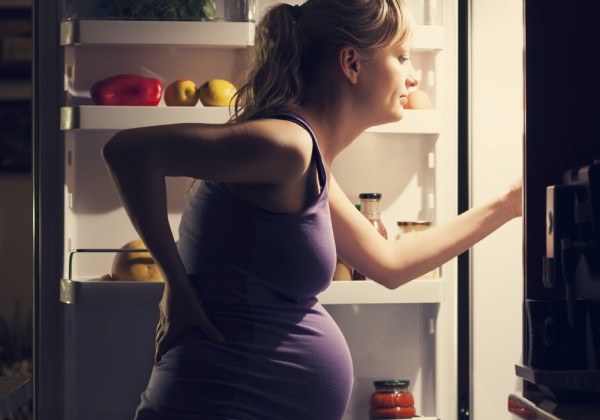Understanding the importance of Early-Life Nutritional programming (ENP) is one thing, but understanding how to get all those vitamins, micro- and macro-nutrients you need from food sources is quite another. While dietitians will always recommend a diet rich in a variety of nutritious foods including plenty of fruit and vegetables, lean meats, dairy and wholegrains, here is a cheat sheet of 10 pregnancy foods you might not have realised can be of benefit for your baby’s future, adult health.
1. Bananas
This fruit is a top source of resistant starch, which is important for maintaining healthy gut bacteria, and therefore maintaining a healthy immune system. Bananas aslo contain vitamin B6 (one small banana provides around a quarter of your daily needs), which helps with the production of neurotransmitters – including serotonin and Gamma-Amino Butyric Acid (GABA). Bananas are a great source of vitamin C, folate, niacin, riboflavin and pantothenic acid.
2. Oranges
As well as providing a valuable source of fibre, oranges are also rich in vitamin C – essential for tissue repair and bone growth. Oranges will also help your body absorb iron, an important mineral which produces extra red blood cells to cater for the growth of the baby and placenta.
3. Asparagus
This green vegetable is an excellent source of folic acid (which reduces the risk of neural tube defects), as well as vitamin B6, calcium, zinc and magnesium. Asparagus also contains relatively high levels of beta-carotene, vitamin C, vitamin E, vitamin K, thiamin, riboflavin, rutin, niacin, folic acid, iron, phosphorus, copper, potassium, selenium and manganese. Best of all, asparagus is very rich in dietary fibre – a 100 gram serving of asparagus contains approximately 2.1 grams of dietary fibre.
4. Nuts
Contrary to popular belief, nuts are no longer considered an allergen risk to developing babies, and the health benefits are many. Like all plant foods, nuts are a good source of antioxidants and a range of vitamins and minerals. They also have high levels of the healthy fats (mono and polyunsaturated fats) and low levels of the unhealthy fats (saturated fats). They are a good source of protein (containing around 10-20 percent, a similar amount found in eggs), and an excellent source of fibre. Choose raw and unsalted nuts, and be aware that a serve of nuts is about 1/3 of a cup or 30g – they will bump up your energy intake, which means too many calories if you go … well, nuts.
5. Chickpeas
Chickpeas pack a nutritional punch, offering many benefits to a developing baby. They are rich in fibre, protein, folate, manganese (just one cup supplies 84.5 percent of the RDI), and iron. They are also low GI and are helpful in reducing blood sugar levels – so a good choice for those with diabetes. Try dry roasting them for a handy snack food.
6. Lentils
Lentils contain the highest amount of protein originating from any plant (up to 35 percent), which is comparable to red meat, poultry, fish, and dairy products. They are also a good source of fibre, molybdenum, folate, tryptophan, manganese, iron, phosphorus, copper, vitamin B1, and potassium. Last but not least, lentils are a source of phytochemicals and phenols. They can easily be added to casseroles, rice dishes and soups to bump up the health benefits in your meal.
7. Eggs
Providing iodine, protein and vitamin A, eggs can be pre-boiled for an easy snack, or sandwich filling, or whipped into an omelette for a quick and easy breakfast. Iodine deficiency is the world’s leading cause of preventable intellectual disability or mental retardation in children.
8. Sardines
While most of us know fish is good for developing your baby’s brain and nervous tissue, did you know it is also a source of iodine? One to three serves of fish per week is recommended, and fish containing soft bones have the added bonus of delivering a calcium boost.
9. Spinach
Another fab source of folate, spinach also contains fibre, manganese, iron, vitamin A, C and K.
10. Greek yoghurt
While regular non-fat yogurt has six to eight grams of protein per serving, Greek yogurt has 15 to 18 grams and is an excellent source of calcium – high on the ‘must eat’ list for expecting mothers for healthy development of bones.
Bonus tip – if you’re plagued by morning sickness and worried how many nutrients you are getting, try throwing a wide range of fruit and veggies into a juicer to maintain a good balance of vitamins and minerals.







Leave A Comment
You must be logged in to post a comment.